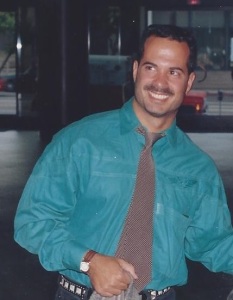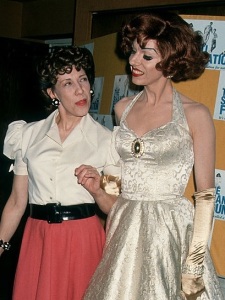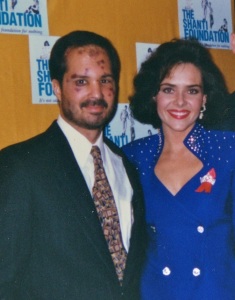It wasn’t easy keeping my composure when I interviewed for my first job for an AIDS agency in 1987. Sitting across from me was Daniel P. Warner, the founder of the first AIDS organization in Los Angeles, LA Shanti. Daniel was achingly beautiful. He had brown eyes as big as serving platters and muscles that fought the confines of the safe sex t-shirt he was wearing.
 At 26 years old, with my red hair and freckles that had not yet faded, I wasn’t used to having conversations with the kind of gorgeous man you might spy across a gay bar and wonder plaintively what it might be like to have him as a friend. But Daniel, one of legions of people who had abandoned whatever career they had planned and went to work building support programs for the sick and dying, did his best to put me at ease. He hired me as his assistant on the spot, and then spent the next few years teaching me the true meaning of community service.
At 26 years old, with my red hair and freckles that had not yet faded, I wasn’t used to having conversations with the kind of gorgeous man you might spy across a gay bar and wonder plaintively what it might be like to have him as a friend. But Daniel, one of legions of people who had abandoned whatever career they had planned and went to work building support programs for the sick and dying, did his best to put me at ease. He hired me as his assistant on the spot, and then spent the next few years teaching me the true meaning of community service.
My new mentor and friend quite literally embodied Shanti’s mission to provide a non-judgmental, compassionate presence to our clients, many of whom were in the final stages of life.
Daniel was also our secret weapon when it came to fund raising. Whether shirtless in a dunking booth, dressed in full leather regalia, or spruced up to meet a major donor, it was tough to resist his charms. He knew his gifts, organizationally and otherwise, and offered them liberally for the benefit of our fledgling agency.
As time went on, Shanti grew enormously but Daniel’s health faltered. He eventually made the decision to move to San Francisco to retire, but we all knew what that really meant. I was resigned to never see him again.
 In 1993, Shanti hosted our biggest, most star-studded fundraiser we had ever produced. It was a tribute to the recently departed entertainer Peter Allen, lost to AIDS, and the magnitude of celebrities who came to perform or pay their respects was like nothing I have ever seen. By that time I had become our director of public relations, and it was my job to corral the stars into the media room for interviews.
In 1993, Shanti hosted our biggest, most star-studded fundraiser we had ever produced. It was a tribute to the recently departed entertainer Peter Allen, lost to AIDS, and the magnitude of celebrities who came to perform or pay their respects was like nothing I have ever seen. By that time I had become our director of public relations, and it was my job to corral the stars into the media room for interviews.
Celebrities like Lily Tomlin, Barry Manilow, Lypsinka, Ann-Margret, Bruce Vilanch, and AIDS icon Michael Callen were making their way through the gauntlet of cameras in the crowded media room. I had tried to no avail to convince our headliner Bette Midler to make herself available to the expectant press, but as I stood in her dressing room pleading my case, she firmly declined, explaining that she had an early morning call for the filming of the television remake of Gypsy. I had tried to insist until she waved me away and started removing her panty hose right in front of me. I nearly tripped through the doorway during my frantic retreat.
Back up in the media room, one of my volunteers approached me with a look of shock and excitement on his face. He pulled me from the doorway. “I didn’t know he was going to be here,” he said with wide eyes. “I mean –“
“Who?” I asked. On my God. Tom Hanks? Richard Gere?
“He’s with Miss America, Mark,” he said. “They’re right behind me.” We both turned as the couple rounded the corner of the hallway. They entered the light of the media room and I barely kept a gasp from escaping.
Beautiful Leanza Cornett, who had been crowned Miss America, in part, by being the first winner to have HIV prevention as her platform, had a very small man at her side. His head bore the inflated effects of chemotherapy, which had apparently done little to stem the lesions that were horribly visible across his face, his neck, his hands. His eyes were swollen nearly shut. In defiance of all this, his lips were parted in a pearly, shining smile that matched the one worn by his gorgeous escort.
I stepped into the media room, wanting to collect myself, to wipe the look of pity off my face. I swallowed hard and stepped into the doorway to announce them to the press.
 “Ladies and gentlemen,” I said. “Miss America 1993 Leanza Cornett, escorted by Mr. Daniel Warner, co-founder of the Los Angeles Shanti Foundation.”
“Ladies and gentlemen,” I said. “Miss America 1993 Leanza Cornett, escorted by Mr. Daniel Warner, co-founder of the Los Angeles Shanti Foundation.”
The couple walked into the bright light and several flashes went off at once. And then the condition of Miss America’s companion dawned on the camera crews. A few flashes continued, slowly, like a strobe light, and across the room a few of the photographers lifted their eyes from their equipment to be sure their lenses had not deceived them.
Daniel looked to me with a graceful smile, and it became a full, sunny grin as he looked to the beauty queen beside him and put his arm around her. She pulled him closer to her. Their faces sparkled and beamed – glorious, joyful, defiant – in the blazing light of the room.
That man, I thought to myself, that brave, incredible man is the biggest star I have ever seen.
And then the pace of the flashes began to grow as the photographers realized they were witnessing something profound. The couple walked the path through the room and toward the other door. “Just one more, Mr. Warner?” one suddenly called out. “Miss America! Just another?” The room became a cacophony of fluttering lenses and calls to look this way and that, all of it powered by two incandescent smiles.
Daniel and Leanza held tight to each other, their delight lifted another notch as they basked in their final call. Every moment of grace, every example of bravery and resilience I have known from people living with HIV, can be summed up in that glorious instant of joy and empowerment.
“Boss!” I said to him as they exited the room. “I didn’t know you would be here. It’s just… so great.”
He winked at me. “I’ll be around,” he said. “I brought my whole family with me tonight. I need to get to the party and show off my new girlfriend!” The three of us laughed, and then I watched Daniel and Miss America, arm in arm, disappear down the hall and into the reception.
Only months later, I was at my desk in Atlanta in my new position as director of a coalition of people living with HIV when I received a phone call.
“Mark, this is Daniel,” said a weakened voice. “Monday is my birthday, and I thought that might be a good day to leave.” Daniel had always been fiercely supportive of the right of the terminally ill to die with dignity and on their own terms. We shared some of our favorite memories of our days at Shanti and I was able to thank him for his faith in me and setting into motion a lifetime of work devoted to those of us living with HIV.
Daniel P. Warner, as promised, died on his birthday on Monday, June 14, 1993. He was 38 years old.
Mark
(This story is adapted from my book, A Place Like This. Photo credits: Daniel Warner by Jim Blevins; Lily Tomlin and Lypsinka by Ron Galella; and Leanza Cornett and Daniel Warner by Karen Ocamb.)




